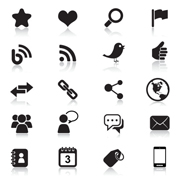 iStockphoto/Thinkstock
iStockphoto/Thinkstock
If you see a mental health professional about depression or anxiety, there’s a chance they could ask about your Facebook habits, but concern about social media website usage is not necessarily justified.
An increasing amount of research is being conducted on social media sites and their potential impact on mental health.
Two new studies came out suggesting Facebook and Twitter could increase anxiety and low self-esteem/self-consciousness, but that Facebook is not associated with depression.
A study from the University of Wisconsin revealed that there is no association between the length of time using Facebook and an increase in depression, according to a news release.
A different study spearheaded by the organization Anxiety UK and conducted by the University of Salford “found that over half of respondents who regularly use social networking sites saw their behaviour change negatively,” according to an article on Anxiety UK’s website.
This behavior change included having difficulties relaxing and disconnecting, comparing oneself to others in a negative manner and being “confrontational online.”
“The study also found that 45 per cent of people who are not able to access their social networks or email feel worried or uncomfortable as a result,” according to the article.
These results suggest that sites like Twitter and Facebook could lead to anxiety or worsen symptoms for people who already have anxiety if they don’t have control over their technology use.
Although one study refutes previous claims of a “Facebook depression,” some mental health professionals like Stephanie Moulton Sarkis, a licensed mental health counselor, still think social media sites could be harmful, as the other study suggested.
“I think when social media replaces personal interaction, it can lead to depression and anxiety,” Sarkis said.
“It may also be that if a person is depressed or anxious, Facebook is a way to have social contact without pressure. I think people can experience depression and anxiety from overuse of social media, and if depression and anxiety already exist, social media can increase isolation.”
She believes that with the fast advancement of technology, research on social media’s relationship to mental health is important. She added that there are signs people can watch for to suggest that they are being negatively impacted by social media.
“Signs to look for are when the behavior of checking social media becomes compulsive, or if a person starts obsessing over things other people are saying on social media,” Sarkis said.
“If someone is feeling isolation or loneliness, seeing a mental health professional may be helpful. And of course, any feelings of suicide should be addressed immediately.”
She has general tips for people who want to control their use of social media.
“Set a timer when you get online. When the timer goes off, log off,” Sarkis said.
“Also, shut off all electronics at least one hour before bed. Make face-to-face contact with friends and family, purely for social interaction, at least three times a week.”
Joumana Nasr, a certified life coach and the creator of Precious Victories coaching, said in an email that whether social media has an impact on users depends on their relationship with it and their predisposition to depression or anxiety.
She believes the technology itself doesn’t cause the issue, it’s just a tool. In her own experience, Facebook was a useful way to help her deal with depression by reconnecting with old high school friends.
“This allowed me to get out of my head and thoughts and forced me to turn my focus towards more pleasant and fun memories,” Nasr said.
She said research even points to an increase in the love/bonding hormone oxytocin (and a decrease in the stress hormone cortisol) when using social media sites.
However, people need to be careful and avoid becoming addicted to social media and using it as a replacement for real relationships, which could lead to anxiety and stress if social skills are lost.
She suggested making an effort to connect with people over the phone and in-person instead of only keeping up with them on Facebook. It will help users stay truly connected, and family and friends will also appreciate the genuine attention.
“If you find yourself out with friends and having to update your status constantly or Tweeting your location, I would suggest you get rid of the Internet service on your cell phone,” Nasr said.
"Be present with the friends you are with. They deserve your attention as well.”
Sources:
School of Medicine and Public Health – University of Wisconsin-Madison. Facebook Use Does Not Lead to Depression, According to New Study. Web. July 17, 2012.
http://www.med.wisc.edu/news-events/facebook-use-does-not-lead-to-depression-according-to-new-study/38208
Anxiety UK. Anxiety UK study finds technology can increase anxiety. Web. July 17, 2012.
http://www.anxietyuk.org.uk/2012/07/for-some-with-anxiety-technology-can-increase-anxiety
Sarkis, Stephanie. Email interview. July 16, 2012.
http://www.stephaniesarkis.com
Nasr, Joumana. Email interview. July 16, 2012.
http://www.preciousvictories.com
Reviewed July 17, 2012
by Michele Blacksberg RN
Edited by Jody Smith




Add a Comment1 Comments
Health and Medication
October 29, 2012 - 12:35amhttp://goo.gl/L68X4
Answer your medical questions on prescription drugs, vitamins and Over the Counter medications. Find medical information, terminology and advice including issues Heart Diseases, Cancer, Asthma, Erectile Dysfunction, AIDS, Diabetes, Obesity, Sexually Transmitted Diseases, Arthritis are major diseases in world.
This Comment